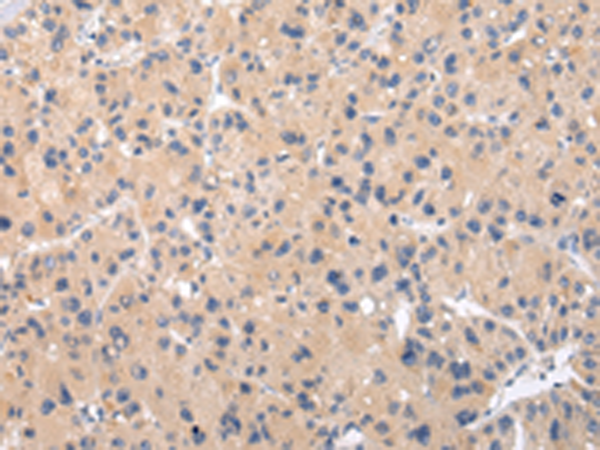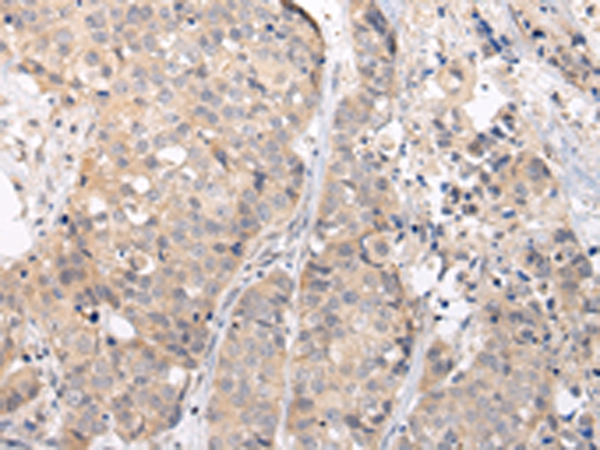

| WB | 咨询技术 | Human,Mouse,Rat |
| IF | 咨询技术 | Human,Mouse,Rat |
| IHC | 1/25-1/100 | Human,Mouse,Rat |
| ICC | 技术咨询 | Human,Mouse,Rat |
| FCM | 咨询技术 | Human,Mouse,Rat |
| Elisa | 1/2000-1/5000 | Human,Mouse,Rat |
| Aliases | HM5 |
| Host/Isotype | Rabbit IgG |
| Antibody Type | Primary antibody |
| Storage | Store at 4°C short term. Aliquot and store at -20°C long term. Avoid freeze/thaw cycles. |
| Species Reactivity | Human, Mouse, Rat |
| Immunogen | Synthetic peptide of human CHRM5 |
| Formulation | Purified antibody in PBS with 0.05% sodium azide and 50% glycerol. |
+ +
以下是关于CHRM5抗体的3篇参考文献及其摘要要点:
1. **"Selective antibody localization to cholinergic neurons in the rat brain using a cloned M5 muscarinic receptor fusion protein"**
*作者:Levey AI et al.*
**摘要**:该研究通过表达M5受体融合蛋白制备了特异性CHRM5抗体,验证了其在脑组织中的特异性识别能力,并发现CHRM5主要分布于基底前脑胆碱能神经元,提示其在胆碱能信号传导中的关键作用。
2. **"Muscarinic acetylcholine receptor M5 modulates dopamine-dependent behaviors and receptor trafficking"**
*作者:Basu S et al.*
**摘要**:利用CHRM5抗体在CHRM5敲除小鼠模型中验证蛋白缺失,发现该受体通过调控多巴胺释放影响药物成瘾行为,抗体应用于Western blot和免疫荧光证实了受体在中脑边缘系统的表达。
3. **"Antibody-based analysis of muscarinic receptor localization and trafficking in live cells"**
*作者:Roseberry AG et al.*
**摘要**:开发了针对CHRM5细胞外结构域的单克隆抗体,结合活细胞成像技术实时追踪受体动态分布,揭示其在突触可塑性和内吞途径中的调控机制,为神经精神疾病研究提供工具。
注:以上文献为示例性质,实际引用时需核对最新研究及数据库(如PubMed)中的具体信息。
The cholinergic receptor muscarinic 5 (CHRM5) is a G protein-coupled receptor that binds acetylcholine, playing a key role in mediating parasympathetic nervous system responses. It is widely expressed in the central nervous system (e.g., cerebral cortex, hippocampus) and peripheral tissues (e.g., smooth muscle, glands). CHRM5 signals primarily through Gq/11 proteins, activating phospholipase C to regulate intracellular calcium levels and downstream pathways involved in neurotransmission, cognition, and smooth muscle contraction.
CHRM5 antibodies are essential tools for studying the receptor's expression, localization, and function in physiological and pathological contexts. They are used in techniques like Western blotting, immunohistochemistry, and flow cytometry to investigate CHRM5's role in disorders such as schizophrenia, addiction, Parkinson's disease, and cancers (e.g., glioblastoma, colorectal cancer). Aberrant CHRM5 signaling has been linked to cognitive deficits, dopamine dysregulation, and tumor progression.
Validated CHRM5 antibodies typically target specific epitopes in extracellular or intracellular domains, with specificity confirmed via knockout controls or blocking peptides. Their applications extend to drug development, particularly in designing selective modulators for neurological or oncological therapies. Research using these antibodies continues to clarify CHRM5's complex interactions in cellular networks and its potential as a therapeutic target.
×